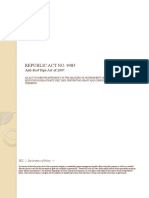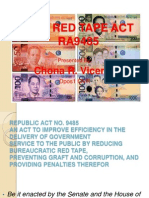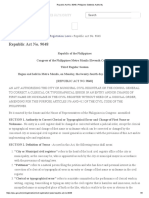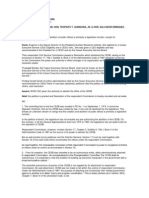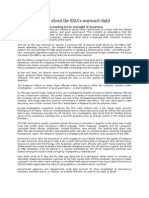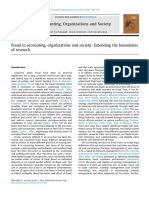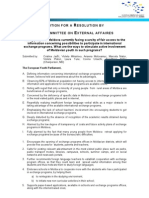0 ratings0% found this document useful (0 votes)
7 viewsR.A 9485
R.A 9485
Uploaded by
Trisha ArcillaThe Anti-Red Tape Act of 2007 aims to improve efficiency and reduce corruption in Philippine government services. It requires all government agencies to establish clear procedures and timelines for public transactions, display Citizens' Charters outlining these, and hold agency heads accountable. It also limits signatures required on documents, mandates assistance for complaints, and establishes criminal penalties for fixers who facilitate transactions improperly. The law aims to promote transparency, accountability and simplified processes to expedite public services.
Copyright:
© All Rights Reserved
Available Formats
Download as DOCX, PDF, TXT or read online from Scribd
R.A 9485
R.A 9485
Uploaded by
Trisha Arcilla0 ratings0% found this document useful (0 votes)
7 views3 pagesThe Anti-Red Tape Act of 2007 aims to improve efficiency and reduce corruption in Philippine government services. It requires all government agencies to establish clear procedures and timelines for public transactions, display Citizens' Charters outlining these, and hold agency heads accountable. It also limits signatures required on documents, mandates assistance for complaints, and establishes criminal penalties for fixers who facilitate transactions improperly. The law aims to promote transparency, accountability and simplified processes to expedite public services.
Copyright
© © All Rights Reserved
Available Formats
DOCX, PDF, TXT or read online from Scribd
Share this document
Did you find this document useful?
Is this content inappropriate?
The Anti-Red Tape Act of 2007 aims to improve efficiency and reduce corruption in Philippine government services. It requires all government agencies to establish clear procedures and timelines for public transactions, display Citizens' Charters outlining these, and hold agency heads accountable. It also limits signatures required on documents, mandates assistance for complaints, and establishes criminal penalties for fixers who facilitate transactions improperly. The law aims to promote transparency, accountability and simplified processes to expedite public services.
Copyright:
© All Rights Reserved
Available Formats
Download as DOCX, PDF, TXT or read online from Scribd
Download as docx, pdf, or txt
0 ratings0% found this document useful (0 votes)
7 views3 pagesR.A 9485
R.A 9485
Uploaded by
Trisha ArcillaThe Anti-Red Tape Act of 2007 aims to improve efficiency and reduce corruption in Philippine government services. It requires all government agencies to establish clear procedures and timelines for public transactions, display Citizens' Charters outlining these, and hold agency heads accountable. It also limits signatures required on documents, mandates assistance for complaints, and establishes criminal penalties for fixers who facilitate transactions improperly. The law aims to promote transparency, accountability and simplified processes to expedite public services.
Copyright:
© All Rights Reserved
Available Formats
Download as DOCX, PDF, TXT or read online from Scribd
Download as docx, pdf, or txt
You are on page 1of 3
Republic Act No.
9485
Signed on June 2, 2007
Republic of the Philippines
Congress of the Philippines
Metro Manila
Thirteenth Congress
Third Special Session
Begun and held in Metro Manila, on Monday, the nineteenth day of February, two thousand
seven.
[REPUBLIC ACT NO. 9485]
AN ACT TO IMPROVE EFFICIENCY IN THE DELIVERY OF GOVERNMENT SERVICE
TO THE PUBLIC BY REDUCING BUREAUCRATIC RED TAPE, PREVENTING GRAFT
AND CORRUPTION, AND PROVIDING PENALTIES THEREFOR
Be it enacted by the Senate and House of Representatives of the Philippines in Congress
assembled:
SECTION 1. Short Title. — This Act shall be known as the “Anti-Red Tape Act of 2007.”
SEC. 2. Declaration of Policy. — It is hereby declared the policy of the State to promote
integrity, accountability, proper management of public affairs and public property as well as to
establish effective practices aimed at the prevention of graft and corruption in government.
Towards this end, the State shall maintain honesty and responsibility among its public officials
and employees, and shall take appropriate measures to promote transparency in each agency with
regard to the manner of transacting with the public, which shall encompass a program for the
adoption of simplified procedures that will reduce red tape and expedite transactions in
government.
SEC. 3. Coverage. — This Act shall apply to all government offices and agencies including local
government units and government-owned or -controlled corporations that provide frontline
services as defined in this Act. Those performing judicial, quasi-judicial and legislative functions
are excluded from the coverage of this Act.
including departments, bureaus, offices, instrumentalities, or government-owned and/or
controlled corporations, or local government or district units shall set up their respective service
standards to be known as the Citizen’s Charter in the form of information billboards which
should be posted at the main entrance of offices or at the most conspicuous place, and in the
form of published materials written either in English, Filipino or in the local dialect, that detail:
(a) The procedure to obtain a particular service;
(b) The person/s responsible for each step;
(c) The maximum time to conclude the process;
(d) The document/s to be presented by the customer, if necessary;
(e) The amount of fees, if necessary; and
(f) The procedure for filing complaints.
SEC. 7. Accountability of the Heads of Offices and Agencies. — The head of the office or agency
shall be primarily responsible for the implementation of this Act and shall be held accountable to
the public in rendering fast, efficient, convenient and reliable service. All transactions and
processes are deemed to have been made with the permission or clearance from the highest
authority having jurisdiction over the government office or agency concerned.
SEC. 8. Accessing Frontline Services. — The following shall be adopted by all government
offices and agencies:
(a) Acceptance of Applications and Requests — (1) All officers or employees shall accept
written applications; requests, and/or documents being submitted by clients of the office or
agency.
(2) The responsible officer or employee shall acknowledge receipt of such application and/or
request by writing or printing clearly thereon his/her name, the unit where he/she is connected
with, and the time and date of receipt.
(3) The receiving officer or employee shall perform a preliminary assessment of the request so as
to promote a more expeditious action on requests.
(b) Action of Offices — (1) All applications and/or requests submitted shall be acted upon by the
assigned officer or employee during the period stated in the Citizen’s Charter which shall not be
longer than five working days in the case of simple transactions and ten (10) working days in the
case of complex transactions from the date the request or application was received. Depending
on the nature of the frontline services requested or the mandate of the office or agency under
unusual circumstances, the maximum time prescribed above may be extended. For the extension
due to the nature of frontline services or the mandate of the office or agency concerned, the
period for the delivery of frontline services shall be indicated in the Citizen’s Charter. The office
or agency concerned shall notify the requesting party in writing of the reason for the extension
and the final date of release for the extension and the final date of release of the frontline
service/s requested.
(2) No application or request shall be returned to the client without appropriate action. In case an
application or request is disapproved, the officer or employee who rendered the decision shall
send a formal notice to the client within five working days from the receipt of the request and/or
application, stating therein the reason for the disapproval including a list of specific requirements
which the client failed to submit.
(c) Denial of Request for Access to Government Service — Any denial of request for access to
government service shall be fully explained in writing, stating the name of the person making the
denial and the grounds upon which such denial is based. Any denial of request is deemed to have
been made with the permission or clearance from the highest authority having jurisdiction over
the government office or agency concerned.
(d) Limitation of Signatories — The number of signatories in any document shall be limited to a
maximum of five signatures which shall represent officers directly supervising the office or
agency concerned.
(e) Adoption of Working Schedules to Serve Clients — Heads of offices and agencies which
render frontline services shall adopt appropriate working schedules to ensure that all clients who
are within their premises prior to the end of official working hours are attended to and served
even during lunch break and after regular working hours.
(f) Identification Card — All employees transacting with the public shall be provided with an
official identification card which should be visibly worn during office hours.
(g) Establishment of Public Assistance/Complaints Desk — Each office or agency shall establish
a public assistance/complaints desk in all their offices.
SEC. 12. Criminal Liability for Fixers. — In addition to Section 11(b), fixers, as defined in this
Act, shall suffer the penalty of imprisonment not exceeding six years or a fine of not less than
Twenty thousand pesos (P20,000.00) but not more than Two hundred thousand pesos
(P200,000.00) or both fine and imprisonment at the discretion of the court.
SEC. 13. Civil and Criminal Liability, Not Barred. — The finding of administrative liability
under this Act shall not be a bar to the filing of criminal, civil or other related charges under
existing laws arising from the same act or omission as herein enumerated.
SEC. 14. Administrative Jurisdiction. — The administrative jurisdiction on any violation of the
provisions of this Act shall be vested on either the Civil Service Commission (CSC), the
Presidential Anti-Graft Commission (PAGC) or the Office of the Ombudsman as determined by
appropriate laws and issuances.
Gazette or in two national newspapers of general circulation.
Approved,
(Sgd.) JOSE DE VENECIA JR. (Sgd.) MANNY VILLAR.
Speaker of the House President of the Senate
of Representatives
This Act which is a consolidation of Senate Bill No. 2589 and House Bill No. 3776 was finally
passed by the Senate and the House of Representatives on February 8, 2007 and February 20,
2007 respectively.
(Sgd.) ROBERTO P. (Sgd.) OSCAR G. YABES
NAZARENO Secretary of the Senate
Secretary General
House of Representatives
Approved: JUN 02 2007
You might also like
- Justice Lodha Committee Report On IPLDocument59 pagesJustice Lodha Committee Report On IPLLatest Laws TeamNo ratings yet
- Anti Red TapeDocument5 pagesAnti Red TapeBanderado Law OfficesNo ratings yet
- Anti-Red Tape Act of 2007 - RA 9485Document5 pagesAnti-Red Tape Act of 2007 - RA 9485Rudy OrteaNo ratings yet
- Anti Red Tape LawDocument7 pagesAnti Red Tape Lawjohn marshaNo ratings yet
- Anti Red Tape Act of The PhilippinesDocument8 pagesAnti Red Tape Act of The PhilippinesagrichardNo ratings yet
- Be It Enacted by The Senate and The House of Representatives of The Philippines in Congress AssembledDocument6 pagesBe It Enacted by The Senate and The House of Representatives of The Philippines in Congress AssembledAport MartinezNo ratings yet
- Ra 9485Document7 pagesRa 9485Bre GetteNo ratings yet
- The Law Directed Government Agencies To Create A Citizen's CharterDocument4 pagesThe Law Directed Government Agencies To Create A Citizen's Chartertikki0219No ratings yet
- RA 9485 Anti Red TapeDocument42 pagesRA 9485 Anti Red TapeDaysoo DayaNo ratings yet
- Anti-Red Tape Act (R.a. 9485)Document8 pagesAnti-Red Tape Act (R.a. 9485)Jm GorgonioNo ratings yet
- R.A. 9485 Anti Red Tape ActDocument57 pagesR.A. 9485 Anti Red Tape Actrjdc121100% (2)
- An Act To Improve Efficiency in The Delivery of Government Service - Ra 9485Document6 pagesAn Act To Improve Efficiency in The Delivery of Government Service - Ra 9485Marlon TabilismaNo ratings yet
- Report 1 ContentDocument35 pagesReport 1 ContentNat HernandezNo ratings yet
- Ra 9485Document9 pagesRa 9485Thomas GonzalesNo ratings yet
- Ra 8424 - NircDocument123 pagesRa 8424 - NircJOHAYNIENo ratings yet
- Anti Red Tape ActDocument38 pagesAnti Red Tape ActryujinxxcastorNo ratings yet
- ARTADocument22 pagesARTAMARCEL NICOLASNo ratings yet
- Anti Red Tape ActDocument26 pagesAnti Red Tape ActRoma Ortiz100% (1)
- Be It Enacted by The Senate and The House of Representatives of The Philippines in Congress AssembledDocument4 pagesBe It Enacted by The Senate and The House of Representatives of The Philippines in Congress AssembledAngelica PioquidNo ratings yet
- Republic Act No.9048Document4 pagesRepublic Act No.9048Queenie SabladaNo ratings yet
- Be It Enacted by The Senate and The House of Representatives of The Philippines in Congress AssembledDocument3 pagesBe It Enacted by The Senate and The House of Representatives of The Philippines in Congress AssembledShinobu WatayaNo ratings yet
- Module 13 (The Ease of Doing Business and Efficient Government Service Delivery Act of 2018)Document27 pagesModule 13 (The Ease of Doing Business and Efficient Government Service Delivery Act of 2018)aliahNo ratings yet
- Executive Order: Freedom of InformationDocument5 pagesExecutive Order: Freedom of InformationNational Citizens' Movement for Free Elections (NAMFREL)No ratings yet
- (Pae1) My Report - Anti Red Tape Act DetailedDocument11 pages(Pae1) My Report - Anti Red Tape Act DetailedomardimarucotNo ratings yet
- Family Code VIIIDocument11 pagesFamily Code VIIImiss independentNo ratings yet
- Ra 9048Document4 pagesRa 9048Jm OlfindoNo ratings yet
- Spec Pro Sep 5Document69 pagesSpec Pro Sep 5Ýel ÄcedilloNo ratings yet
- Clerical Error ActDocument6 pagesClerical Error ActHowell Ivan SoriaoNo ratings yet
- Mhervin P. Culang BSMA 3-1 Activity 10Document8 pagesMhervin P. Culang BSMA 3-1 Activity 10Mhervin Pascual CulangNo ratings yet
- RA 11032 - Group 3Document91 pagesRA 11032 - Group 3Hilo MethodNo ratings yet
- Be It Enacted by The Senate and The House of Representatives of The Philippines in Congress AssembledDocument2 pagesBe It Enacted by The Senate and The House of Representatives of The Philippines in Congress AssembledJasmine Montero-GaribayNo ratings yet
- Republic Act No. 11032Document12 pagesRepublic Act No. 11032AnonChieNo ratings yet
- Arta GuidelinesDocument3 pagesArta GuidelinesgibNo ratings yet
- 4 - Salient Features of Ra 9048Document6 pages4 - Salient Features of Ra 9048Tetet RomeroNo ratings yet
- PM Ra 11032 Written Report by John Carlo CapawaDocument16 pagesPM Ra 11032 Written Report by John Carlo CapawaJohn Carlo JoCapNo ratings yet
- Ra 9048-Correction of Errors in Birth Certificate, Change of First NameDocument6 pagesRa 9048-Correction of Errors in Birth Certificate, Change of First NameMifflin UwuNo ratings yet
- Staff of The Office of The SecretDocument17 pagesStaff of The Office of The Secretneedko talagatoNo ratings yet
- Republic Act No.9048Document7 pagesRepublic Act No.9048Ruby Ann ArmasNo ratings yet
- Ra 10707Document3 pagesRa 10707Titel BanzuelaNo ratings yet
- Ease of Doing Business ReviewerDocument19 pagesEase of Doing Business ReviewerLindsay RegalaNo ratings yet
- An Act Promoting Ease of Doing Business and Efficient Government Service Delivery Act of 2018Document42 pagesAn Act Promoting Ease of Doing Business and Efficient Government Service Delivery Act of 2018Barangay MintalNo ratings yet
- National Internal Revenue CodeDocument164 pagesNational Internal Revenue CodeJenny Kenn CanonizadoNo ratings yet
- Republic Act No. 10172Document4 pagesRepublic Act No. 10172Chynah Marie MonzonNo ratings yet
- Red TapeDocument26 pagesRed TapeRoma OrtizNo ratings yet
- Tax Code PDFDocument459 pagesTax Code PDFChristian MuhiNo ratings yet
- Administrative Order No. 23, S. 1992 - Official Gazette of The Republic of The PhilippinesDocument11 pagesAdministrative Order No. 23, S. 1992 - Official Gazette of The Republic of The PhilippinesMackoy WillchurchNo ratings yet
- Republic of The Philippines RA 8424Document235 pagesRepublic of The Philippines RA 8424MikeeMouse07No ratings yet
- Admin Digests - KikoyDocument7 pagesAdmin Digests - KikoyKikoy IlaganNo ratings yet
- Executive Order No. 02, S. 2016-FOIDocument6 pagesExecutive Order No. 02, S. 2016-FOIFilmann SimpaoNo ratings yet
- Ra 9048 Clerical Error LawDocument3 pagesRa 9048 Clerical Error Lawrlg2vmmcNo ratings yet
- Republic Act No (1) - 9485Document23 pagesRepublic Act No (1) - 9485Diana Dizon HensonNo ratings yet
- Section 8. Statements and Disclosure. - Public Officials and Employees Have An Obligation ToDocument4 pagesSection 8. Statements and Disclosure. - Public Officials and Employees Have An Obligation ToDeniseNo ratings yet
- Be It Enacted by The Senate and The House of Representatives of The Philippines in Congress AssembledDocument3 pagesBe It Enacted by The Senate and The House of Representatives of The Philippines in Congress AssembledIa HernandezNo ratings yet
- Spec ProDocument10 pagesSpec Prokero keropiNo ratings yet
- Dress CodeDocument10 pagesDress CodeMelvin M. MercadoNo ratings yet
- Republic Act No 8424Document206 pagesRepublic Act No 8424YanoNo ratings yet
- RA 9485 Anti Red Tape Act of 2007Document3 pagesRA 9485 Anti Red Tape Act of 2007lejigeNo ratings yet
- Bar Review Companion: Taxation: Anvil Law Books Series, #4From EverandBar Review Companion: Taxation: Anvil Law Books Series, #4No ratings yet
- Federal Rules of Civil Procedure: Hyperlinked, #2From EverandFederal Rules of Civil Procedure: Hyperlinked, #2Rating: 5 out of 5 stars5/5 (1)
- Patent Laws of the Republic of Hawaii and Rules of Practice in the Patent OfficeFrom EverandPatent Laws of the Republic of Hawaii and Rules of Practice in the Patent OfficeNo ratings yet
- Act on Anti-Corruption and the Establishment and Operation of the Anti-Corruption: Civil Rights Commission of the Republic of KoreaFrom EverandAct on Anti-Corruption and the Establishment and Operation of the Anti-Corruption: Civil Rights Commission of the Republic of KoreaNo ratings yet
- Master Facility AgreementDocument57 pagesMaster Facility AgreementPoorva KumariNo ratings yet
- NAB Ordinance 1999Document34 pagesNAB Ordinance 1999cyrex33No ratings yet
- ZXCXZXCXZDocument38 pagesZXCXZXCXZVishal VishNo ratings yet
- Public Governance in The MENA Region Reform Trends and PatternsDocument15 pagesPublic Governance in The MENA Region Reform Trends and PatternsMahmoud SabryNo ratings yet
- Robin Theobald (Auth.) - Corruption, Development and Underdevelopment-Palgrave Macmillan UK (1990)Document202 pagesRobin Theobald (Auth.) - Corruption, Development and Underdevelopment-Palgrave Macmillan UK (1990)Komol PalmaNo ratings yet
- A Multidimensional Perspective On Corruption in AfricaDocument425 pagesA Multidimensional Perspective On Corruption in Africayakadimaya43No ratings yet
- Failure of Public Sector Enterprises A CDocument15 pagesFailure of Public Sector Enterprises A Cniloy biswasNo ratings yet
- Class Eight Corruption in BangladeshDocument2 pagesClass Eight Corruption in Bangladeshpuavi0% (1)
- GD Topics With DiscussionDocument14 pagesGD Topics With DiscussionRakesh Singh0% (1)
- BSR Shaping Sustainable Garment Sector MyanmarDocument21 pagesBSR Shaping Sustainable Garment Sector Myanmardsreejareddy22No ratings yet
- Infosys Case Study AnalysisDocument11 pagesInfosys Case Study AnalysisRevappa YeddeNo ratings yet
- Securency's Nigeria Deal, InvestigationsDocument14 pagesSecurency's Nigeria Deal, InvestigationsZaneta2009No ratings yet
- 8 - People vs. SandiganbayanDocument2 pages8 - People vs. SandiganbayanAmberChanNo ratings yet
- MBA 402 Assessment2 Answer Template V3Document6 pagesMBA 402 Assessment2 Answer Template V3awasthisailesNo ratings yet
- 2013 Fraud in Accounting Organization and Society-EditorialDocument18 pages2013 Fraud in Accounting Organization and Society-EditorialAlmi HafizNo ratings yet
- Wang2001 PDFDocument26 pagesWang2001 PDFzhafirarfsNo ratings yet
- Rezoluţiile Parlamentului European Al Tinerilor, Sesiunea Locală Din ChişinăuDocument16 pagesRezoluţiile Parlamentului European Al Tinerilor, Sesiunea Locală Din ChişinăuDaniel VodăNo ratings yet
- Microsoft Supplier Code of Conduct - EnglishDocument15 pagesMicrosoft Supplier Code of Conduct - EnglishMarcu MîrzaNo ratings yet
- Neopatrimonialism and Agricultural Protection: The Case of Maize in MalawiDocument10 pagesNeopatrimonialism and Agricultural Protection: The Case of Maize in MalawireneNo ratings yet
- CPIB-PACT-A Practical Anti-Corruption Guide For Businesses in Singapore (2017) PDFDocument52 pagesCPIB-PACT-A Practical Anti-Corruption Guide For Businesses in Singapore (2017) PDFLim Zer YeeNo ratings yet
- 5th Pillar - PSG Tech WiCamp - 26FEB10Document29 pages5th Pillar - PSG Tech WiCamp - 26FEB10punsumsNo ratings yet
- What Are The Biggest Ethical Challenges Facing South AfricaDocument2 pagesWhat Are The Biggest Ethical Challenges Facing South AfricaNomzamo MlamulaNo ratings yet
- Alya Tugas BinggrisDocument6 pagesAlya Tugas BinggrisMira SusantiNo ratings yet
- An Open Letter To UN Secretary General (August 14, 2011)Document2 pagesAn Open Letter To UN Secretary General (August 14, 2011)msrivast100% (1)
- Analysis of Starbucks and Its International Strategy (2011)Document32 pagesAnalysis of Starbucks and Its International Strategy (2011)deuches200392% (37)
- Corruption and Financial Crimes in Nigeria: Genesis, Trend and Consequences by Mr. E. A. OwolabiDocument91 pagesCorruption and Financial Crimes in Nigeria: Genesis, Trend and Consequences by Mr. E. A. OwolabiElujekwute BenjaminNo ratings yet
- English Project: 'Play of People in Power'Document26 pagesEnglish Project: 'Play of People in Power'Afsheen TahiraNo ratings yet
- Cambodia Report AW4 Med MixedDocument54 pagesCambodia Report AW4 Med MixedRich Long100% (1)
- The Prevalence of Corruption in SomaliDocument26 pagesThe Prevalence of Corruption in SomaliAbdirashid Ismail NorNo ratings yet








